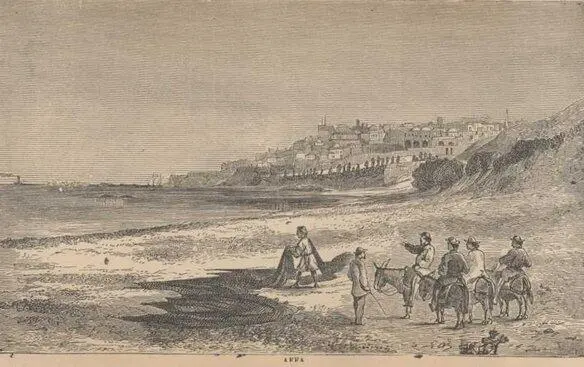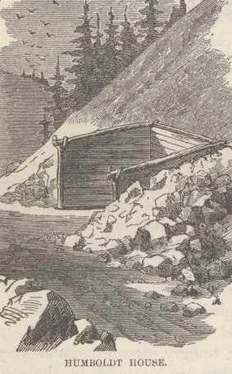Mark Twain - The Innocents Abroad
Здесь есть возможность читать онлайн «Mark Twain - The Innocents Abroad» весь текст электронной книги совершенно бесплатно (целиком полную версию без сокращений). В некоторых случаях можно слушать аудио, скачать через торрент в формате fb2 и присутствует краткое содержание. Год выпуска: 2004, Жанр: Классическая проза, Юмористическая проза, на английском языке. Описание произведения, (предисловие) а так же отзывы посетителей доступны на портале библиотеки ЛибКат.
- Название:The Innocents Abroad
- Автор:
- Жанр:
- Год:2004
- ISBN:нет данных
- Рейтинг книги:5 / 5. Голосов: 1
-
Избранное:Добавить в избранное
- Отзывы:
-
Ваша оценка:
- 100
- 1
- 2
- 3
- 4
- 5
The Innocents Abroad: краткое содержание, описание и аннотация
Предлагаем к чтению аннотацию, описание, краткое содержание или предисловие (зависит от того, что написал сам автор книги «The Innocents Abroad»). Если вы не нашли необходимую информацию о книге — напишите в комментариях, мы постараемся отыскать её.
The Innocents Abroad — читать онлайн бесплатно полную книгу (весь текст) целиком
Ниже представлен текст книги, разбитый по страницам. Система сохранения места последней прочитанной страницы, позволяет с удобством читать онлайн бесплатно книгу «The Innocents Abroad», без необходимости каждый раз заново искать на чём Вы остановились. Поставьте закладку, и сможете в любой момент перейти на страницу, на которой закончили чтение.
Интервал:
Закладка:
We staid all night with the good monks at the convent of Ramleh, and in the morning got up and galloped the horses a good part of the distance from there to Jaffa, or Joppa, for the plain was as level as a floor and free from stones, and besides this was our last march in Holy Land. These two or three hours finished, we and the tired horses could have rest and sleep as long as we wanted it. This was the plain of which Joshua spoke when he said, "Sun, stand thou still on Gibeon, and thou moon in the valley of Ajalon." As we drew near to Jaffa, the boys spurred up the horses and indulged in the excitement of an actual race—an experience we had hardly had since we raced on donkeys in the Azores islands.
We came finally to the noble grove of orange-trees in which the Oriental city of Jaffa lies buried; we passed through the walls, and rode again down narrow streets and among swarms of animated rags, and saw other sights and had other experiences we had long been familiar with. We dismounted, for the last time, and out in the offing, riding at anchor, we saw the ship! I put an exclamation point there because we felt one when we saw the vessel. The long pilgrimage was ended, and somehow we seemed to feel glad of it.

[For description of Jaffa, see Universal Gazetteer.] Simon the Tanner formerly lived here. We went to his house. All the pilgrims visit Simon the Tanner's house. Peter saw the vision of the beasts let down in a sheet when he lay upon the roof of Simon the Tanner's house. It was from Jaffa that Jonah sailed when he was told to go and prophesy against Nineveh, and no doubt it was not far from the town that the whale threw him up when he discovered that he had no ticket. Jonah was disobedient, and of a fault-finding, complaining disposition, and deserves to be lightly spoken of, almost. The timbers used in the construction of Solomon's Temple were floated to Jaffa in rafts, and the narrow opening in the reef through which they passed to the shore is not an inch wider or a shade less dangerous to navigate than it was then. Such is the sleepy nature of the population Palestine's only good seaport has now and always had. Jaffa has a history and a stirring one. It will not be discovered any where in this book. If the reader will call at the circulating library and mention my name, he will be furnished with books which will afford him the fullest information concerning Jaffa.
So ends the pilgrimage. We ought to be glad that we did not make it for the purpose of feasting our eyes upon fascinating aspects of nature, for we should have been disappointed—at least at this season of the year. A writer in "Life in the Holy Land" observes:
"Monotonous and uninviting as much of the Holy Land will appear to persons accustomed to the almost constant verdure of flowers, ample streams and varied surface of our own country, we must remember that its aspect to the Israelites after the weary march of forty years through the desert must have been very different."
Which all of us will freely grant. But it truly is "monotonous and uninviting," and there is no sufficient reason for describing it as being otherwise.
Of all the lands there are for dismal scenery, I think Palestine must be the prince. The hills are barren, they are dull of color, they are unpicturesque in shape. The valleys are unsightly deserts fringed with a feeble vegetation that has an expression about it of being sorrowful and despondent. The Dead Sea and the Sea of Galilee sleep in the midst of a vast stretch of hill and plain wherein the eye rests upon no pleasant tint, no striking object, no soft picture dreaming in a purple haze or mottled with the shadows of the clouds. Every outline is harsh, every feature is distinct, there is no perspective—distance works no enchantment here. It is a hopeless, dreary, heart-broken land.
Small shreds and patches of it must be very beautiful in the full flush of spring, however, and all the more beautiful by contrast with the far-reaching desolation that surrounds them on every side. I would like much to see the fringes of the Jordan in spring-time, and Shechem, Esdraelon, Ajalon and the borders of Galilee—but even then these spots would seem mere toy gardens set at wide intervals in the waste of a limitless desolation.
Palestine sits in sackcloth and ashes. Over it broods the spell of a curse that has withered its fields and fettered its energies. Where Sodom and Gomorrah reared their domes and towers, that solemn sea now floods the plain, in whose bitter waters no living thing exists—over whose waveless surface the blistering air hangs motionless and dead—about whose borders nothing grows but weeds, and scattering tufts of cane, and that treacherous fruit that promises refreshment to parching lips, but turns to ashes at the touch. Nazareth is forlorn; about that ford of Jordan where the hosts of Israel entered the Promised Land with songs of rejoicing, one finds only a squalid camp of fantastic Bedouins of the desert; Jericho the accursed, lies a moldering ruin, to-day, even as Joshua's miracle left it more than three thousand years ago; Bethlehem and Bethany, in their poverty and their humiliation, have nothing about them now to remind one that they once knew the high honor of the Saviour's presence; the hallowed spot where the shepherds watched their flocks by night, and where the angels sang Peace on earth, good will to men, is untenanted by any living creature, and unblessed by any feature that is pleasant to the eye. Renowned Jerusalem itself, the stateliest name in history, has lost all its ancient grandeur, and is become a pauper village; the riches of Solomon are no longer there to compel the admiration of visiting Oriental queens; the wonderful temple which was the pride and the glory of Israel, is gone, and the Ottoman crescent is lifted above the spot where, on that most memorable day in the annals of the world, they reared the Holy Cross. The noted Sea of Galilee, where Roman fleets once rode at anchor and the disciples of the Saviour sailed in their ships, was long ago deserted by the devotees of war and commerce, and its borders are a silent wilderness; Capernaum is a shapeless ruin; Magdala is the home of beggared Arabs; Bethsaida and Chorazin have vanished from the earth, and the "desert places" round about them where thousands of men once listened to the Saviour's voice and ate the miraculous bread, sleep in the hush of a solitude that is inhabited only by birds of prey and skulking foxes.
Palestine is desolate and unlovely. And why should it be otherwise? Can the curse of the Deity beautify a land?
Palestine is no more of this work-day world. It is sacred to poetry and tradition—it is dream-land.
CHAPTER LVII.
The Happiness of being at Sea once more—"Home" as it is in a Pleasure Ship—"Shaking Hands" with the Vessel—Jack in Costume—His Father's Parting Advice—Approaching Egypt—Ashore in Alexandria—A Deserved Compliment for the Donkeys—Invasion of the Lost Tribes of America—End of the Celebrated "Jaffa Colony"—Scenes in Grand Cairo—Shepheard's Hotel Contrasted with a Certain American Hotel—Preparing for the Pyramids
It was worth a kingdom to be at sea again. It was a relief to drop all anxiety whatsoever—all questions as to where we should go; how long we should stay; whether it were worth while to go or not; all anxieties about the condition of the horses; all such questions as "Shall we ever get to water?" "Shall we ever lunch?" "Ferguson, how many more million miles have we got to creep under this awful sun before we camp?" It was a relief to cast all these torturing little anxieties far away—ropes of steel they were, and every one with a separate and distinct strain on it—and feel the temporary contentment that is born of the banishment of all care and responsibility. We did not look at the compass: we did not care, now, where the ship went to, so that she went out of sight of land as quickly as possible. When I travel again, I wish to go in a pleasure ship. No amount of money could have purchased for us, in a strange vessel and among unfamiliar faces, the perfect satisfaction and the sense of being at home again which we experienced when we stepped on board the "Quaker City,"—our own ship—after this wearisome pilgrimage. It is a something we have felt always when we returned to her, and a something we had no desire to sell.
Читать дальшеИнтервал:
Закладка:
Похожие книги на «The Innocents Abroad»
Представляем Вашему вниманию похожие книги на «The Innocents Abroad» списком для выбора. Мы отобрали схожую по названию и смыслу литературу в надежде предоставить читателям больше вариантов отыскать новые, интересные, ещё непрочитанные произведения.
Обсуждение, отзывы о книге «The Innocents Abroad» и просто собственные мнения читателей. Оставьте ваши комментарии, напишите, что Вы думаете о произведении, его смысле или главных героях. Укажите что конкретно понравилось, а что нет, и почему Вы так считаете.












